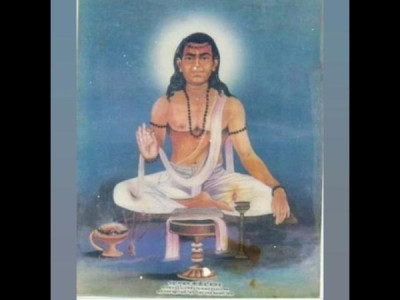Life & Legacy
Early Life and Education
Sri Damodardev hailed from a Brahmin family and received traditional education in Sanskrit scriptures, Vedas, and other classical Hindu texts. His profound knowledge and spiritual curiosity led him to seek deeper truths beyond rituals and orthodox practices. Damodardev was born in a village called Nalaca in (in present-day Nagaon) in the 1488, the third and youngest son of Sushila and Satananda a Brahmin couple. Nalaca was close to Bordowa than, Sankardev's native place, and Satananda was Sankardev's friend. Damodardev and his family moved from the Ahom territories after Sankardev moved from Dhuwahat to Barpeta in 1546 and settled, after some wandering close to Patbausi, or Chandravatipura near Sankardev's sattra.[8] Damodardev received his education along with his two brothers under Kalpacandra of Navadwip in Bengal, where they studied detailed grammar, derivations and usage of words, four Vedas, fourteen scriptures, Gita, Bhagavata Purana and other religious books.
Association with Srimanta Sankardev
The turning point in Damodardev’s life came when he met Srimanta Sankardev. Deeply influenced by Sankardev's teachings of Bhakti (devotion) toward one supreme God-Lord Krishna-Damodardev became one of his most dedicated followers. Though older in age, he respected Sankardev's wisdom and embraced his inclusive religious philosophy.
Role in Spreading the Bhakti Movement
Damodardev played a significant role in disseminating the messages of love, devotion, and equality preached by Sankardev. He established Damodariya Sanghati, a separate sub-sect within the broader Neo-Vaishnavite movement. Though his group maintained some traditional Brahminical practices, it upheld the essence of devotional worship and moral teachings of Sankardev.
Contributions and Legacy
-
Promoted Ekasarana Dharma through teachings, discourses, and spiritual guidance.
-
Founded several Satras (Vaishnavite monasteries) that became centers of religious and cultural activities in Assam.
-
Emphasized the importance of Nam-Prasanga (chanting of God’s name) and Bhagavata Path (reading scriptures).
-
Maintained harmony and mutual respect between the different sub-sects of Neo-Vaishnavism.
Sri Damodardev's contributions significantly shaped the religious and cultural identity of Assam. His efforts to propagate the path of devotion and righteousness helped preserve Assamese spiritual heritage for future generations.
Damodardev Tithi :
Tithi of Damodardev is a regional public holiday in the state of Assam on the 17th day of the month of Vaisakha. This means it usually falls in April or Early May in the western calendar. This holiday honours an important figure in the Vaishnavite movement of Assam.
Conclusion
Sri Damodardev remains a revered figure in Assamese religious history, symbolizing humility, scholarship, and unwavering devotion. His life and teachings continue to inspire countless devotees in Assam and beyond, making him a timeless icon of the Bhakti movement.
